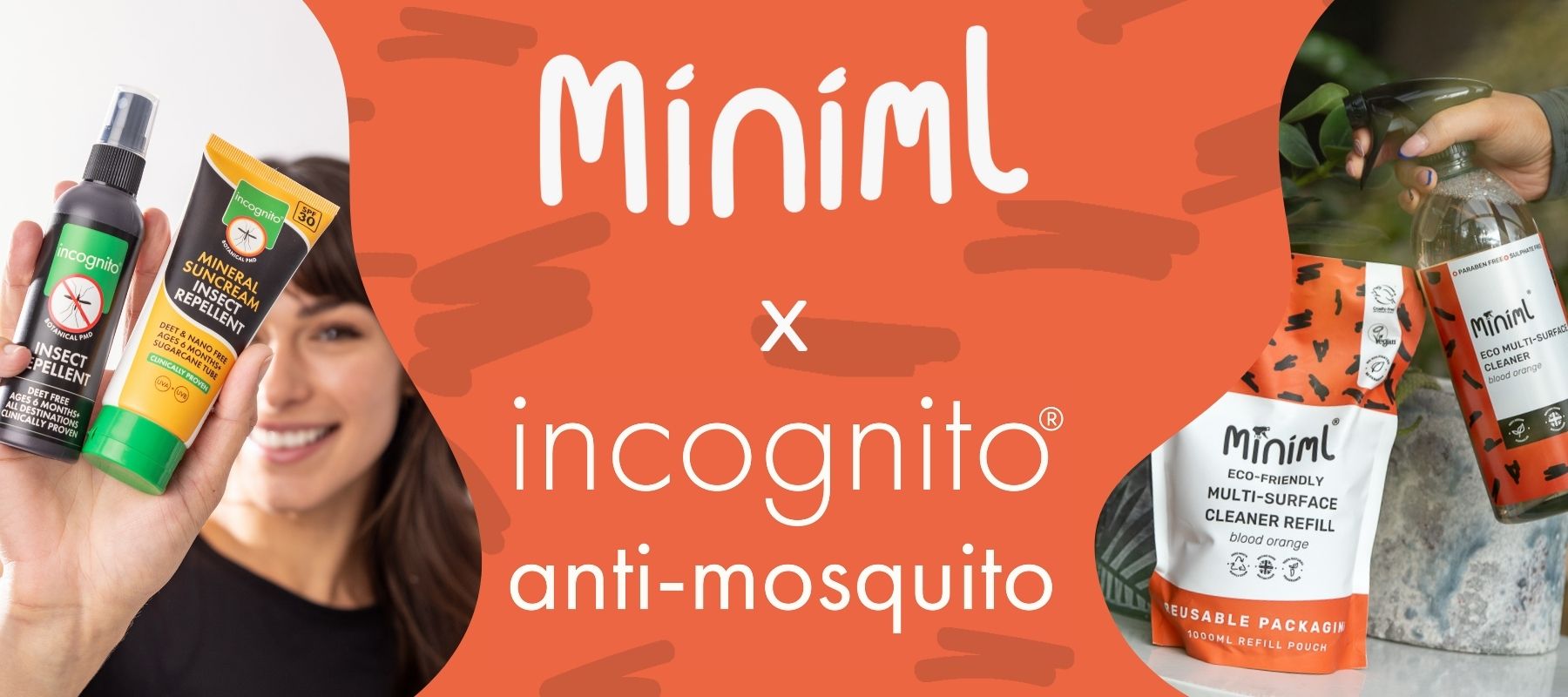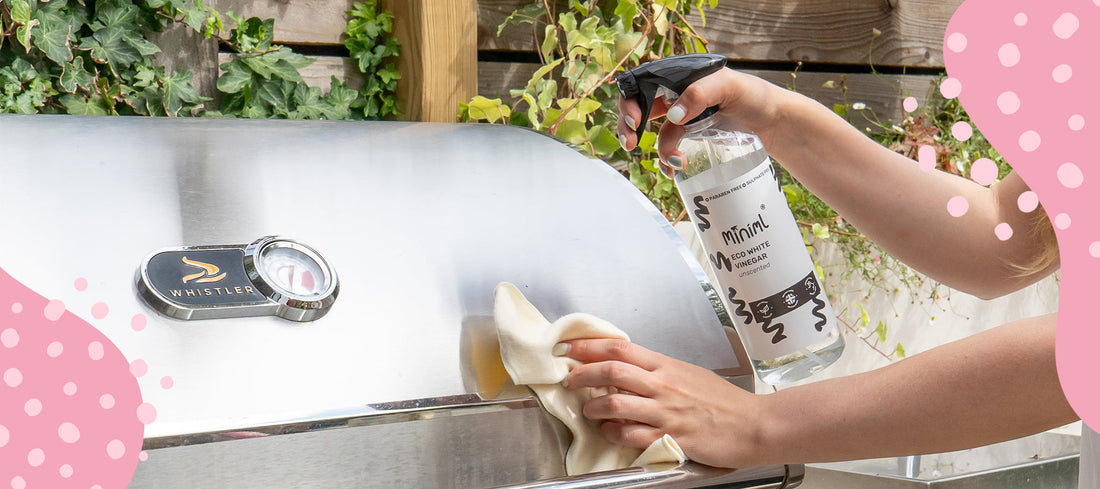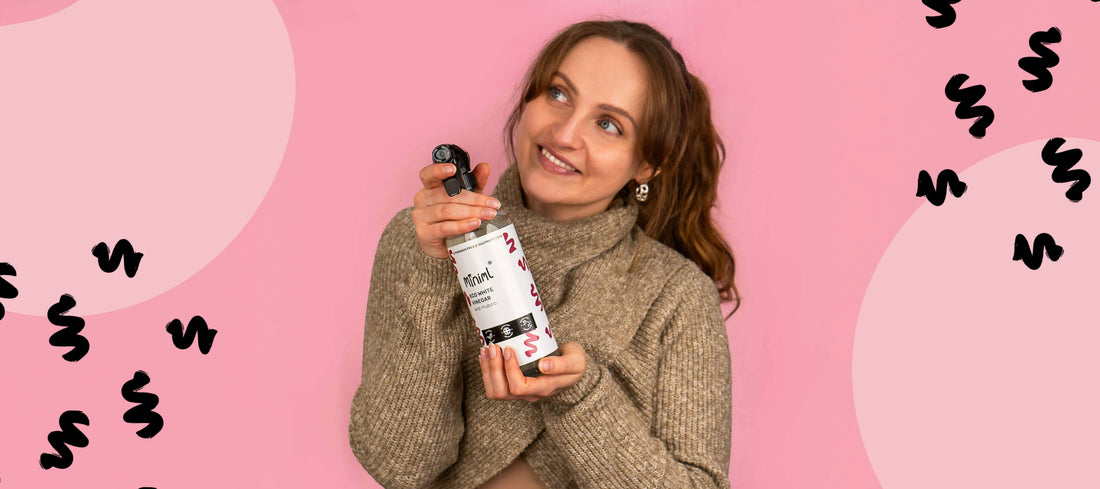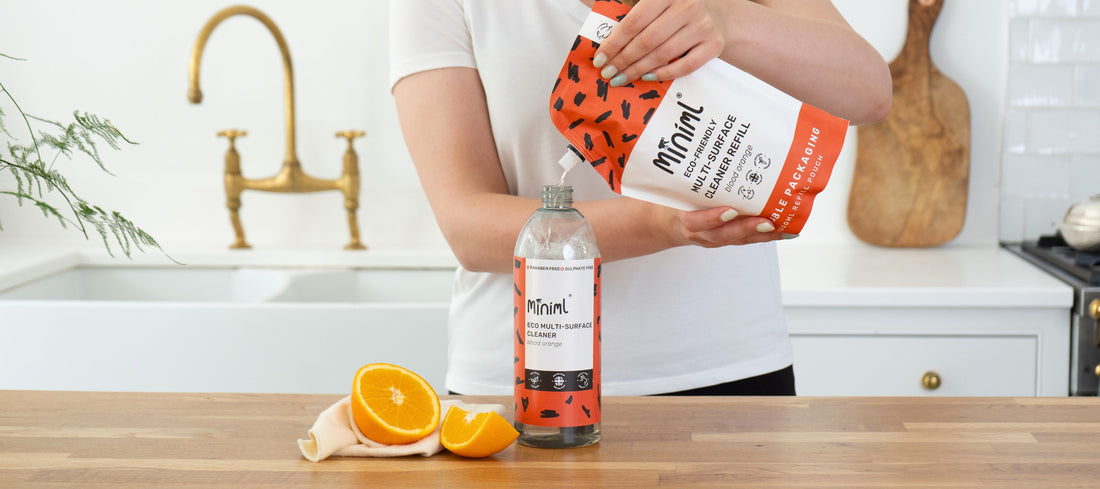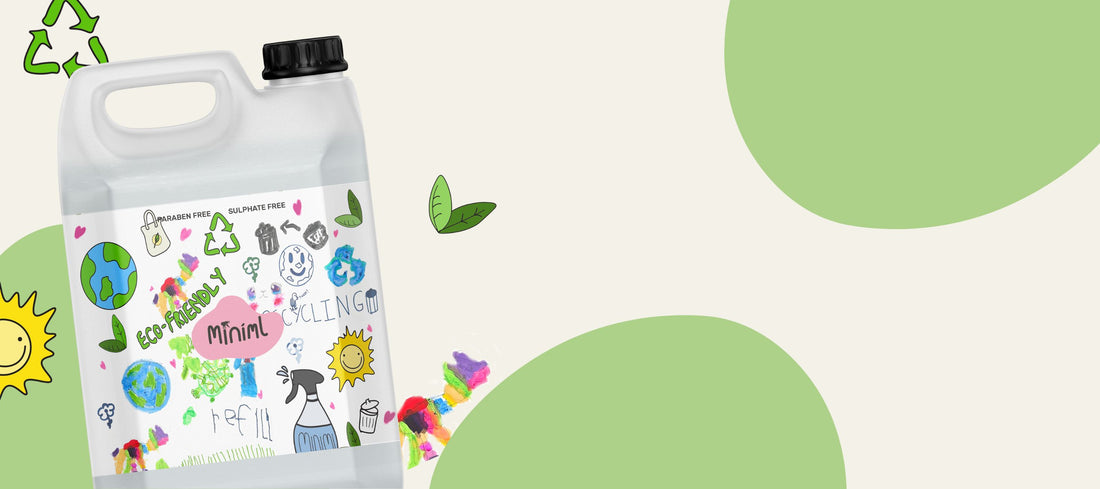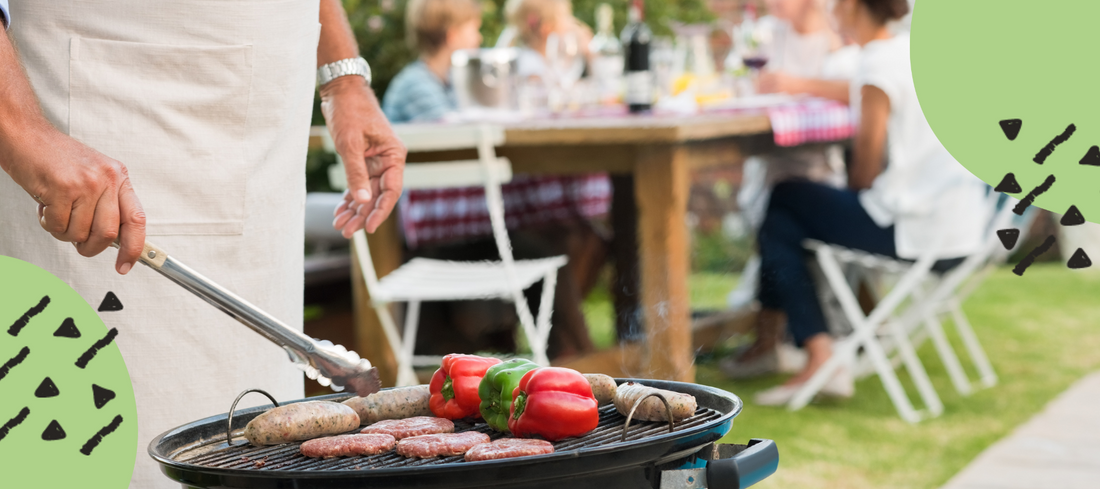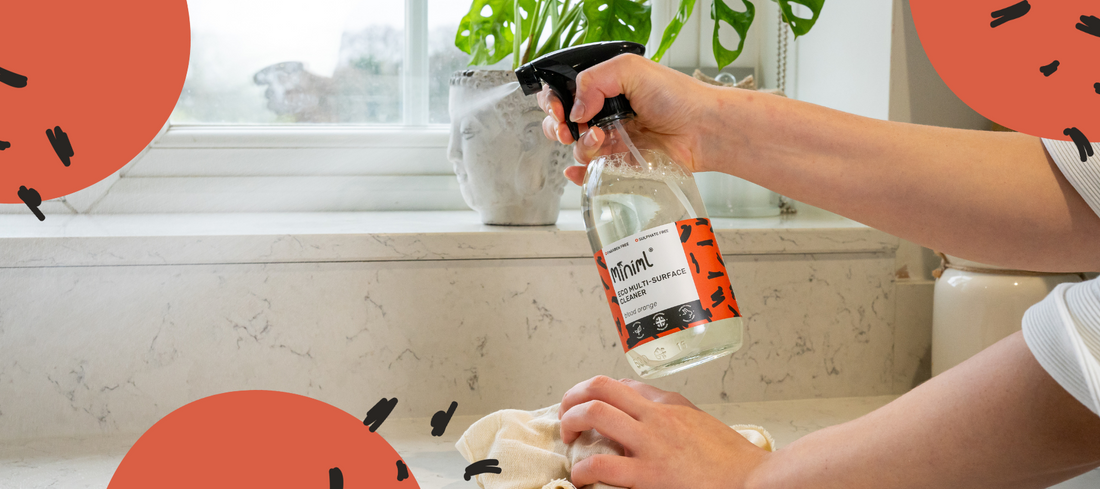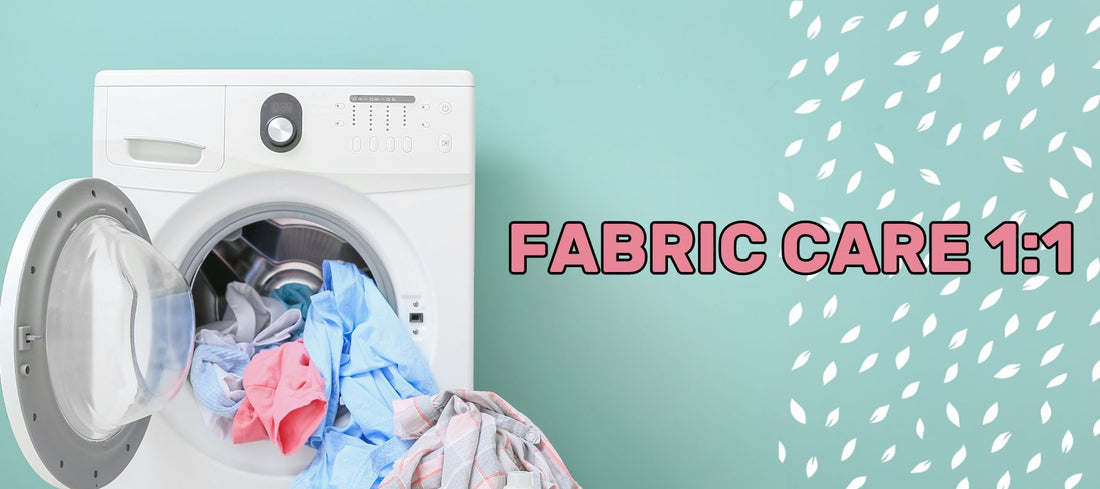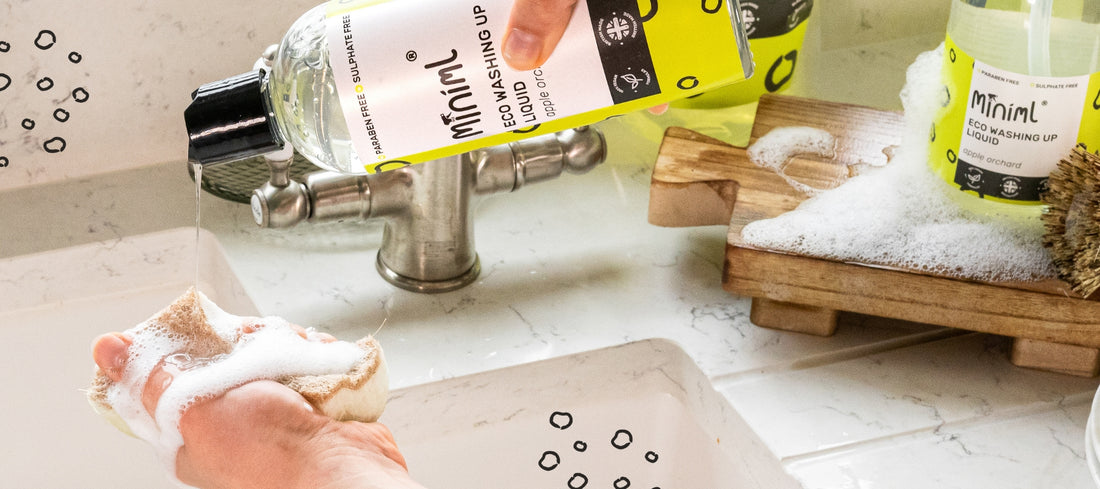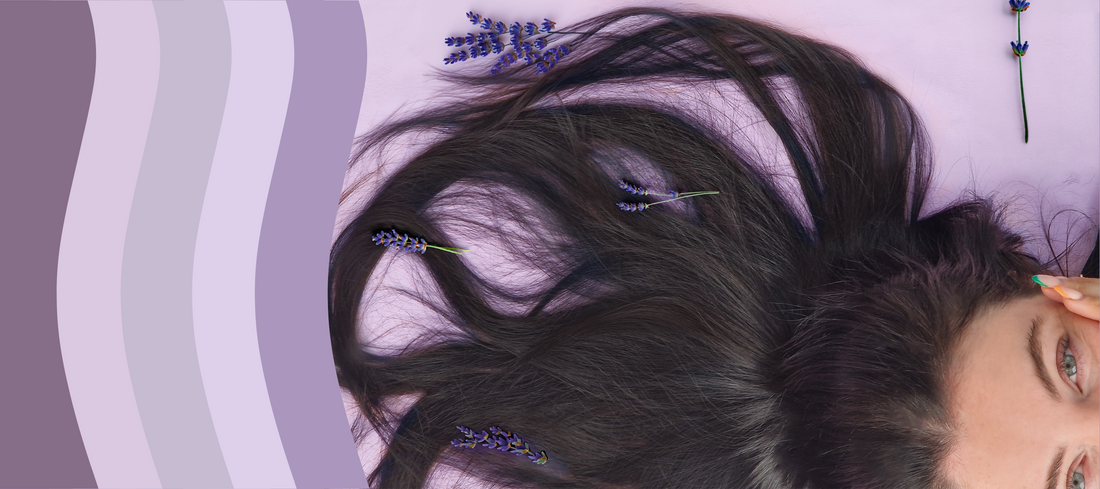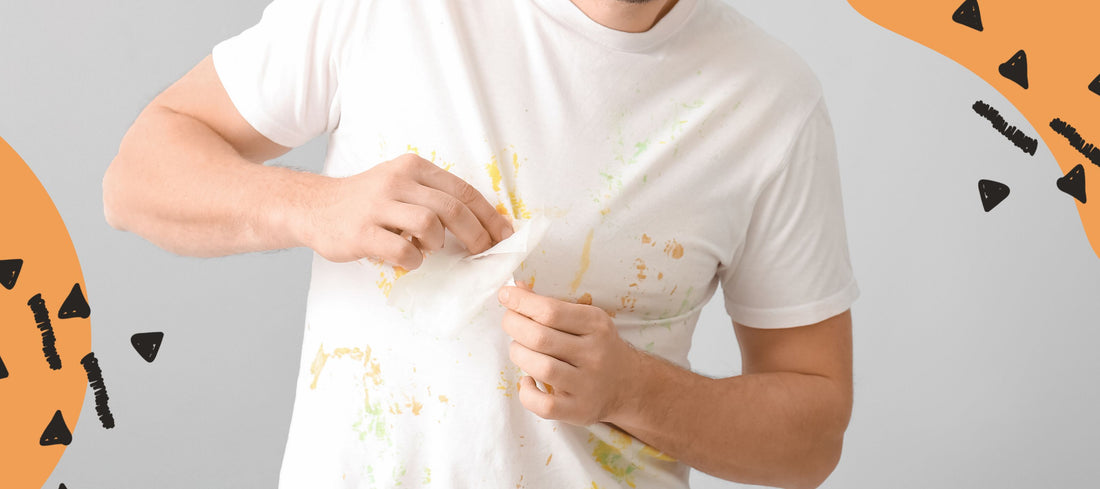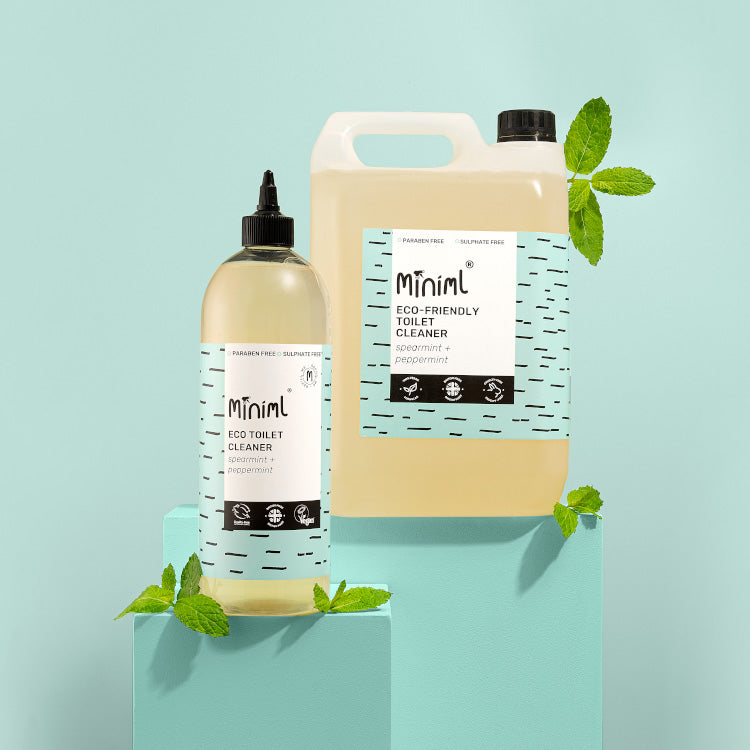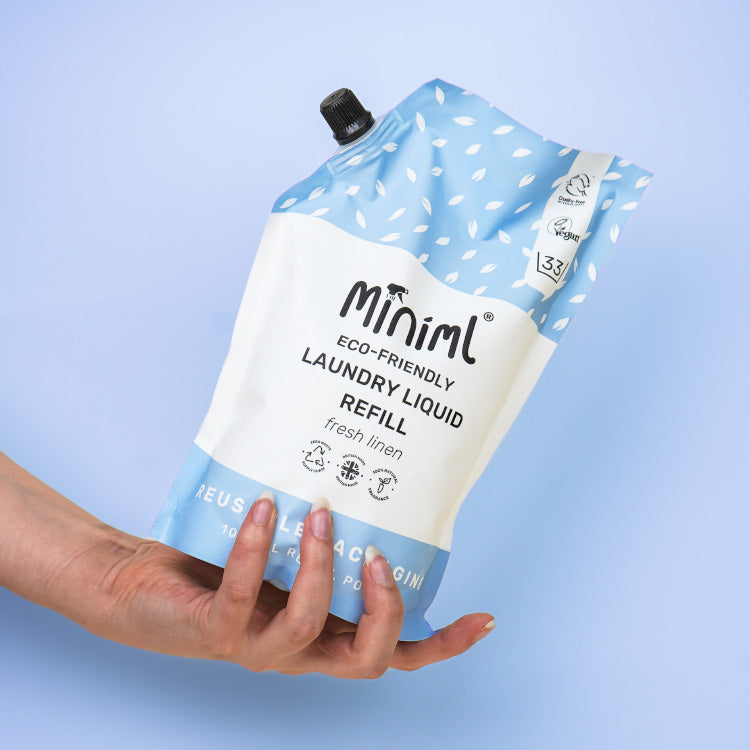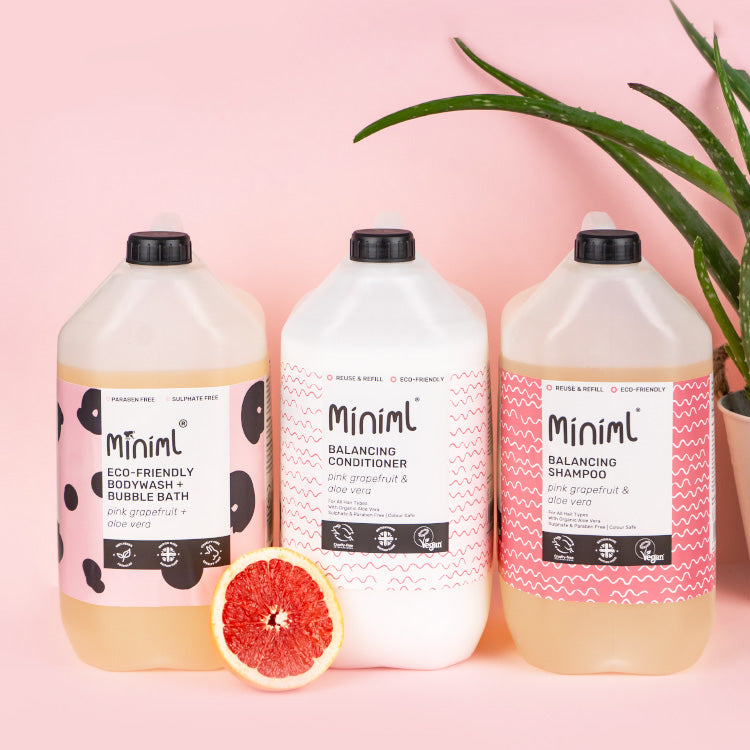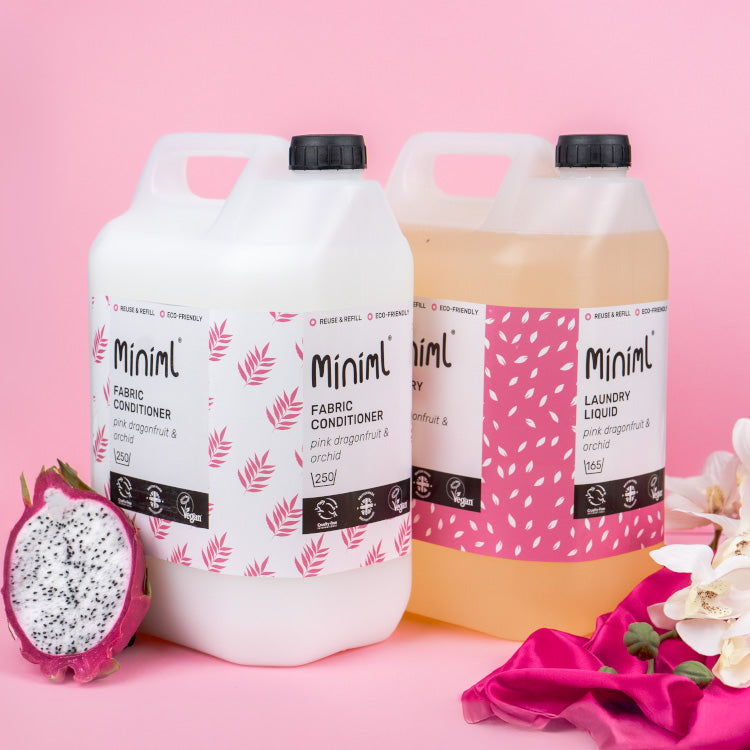Miniml Blog
Save Time on Cleaning This Summer: Easy Tips For A Hassle-Free BBQ Season
Summer’s a season for slowing down—but no one tells that to the laundry pile, the sticky kitchen floors, or the BBQ that hasn’t been cleaned since last year. Luckily, you don’t need a cupboard full of products (or a whole day) to get your space back on track. With a few smart tricks and natural cleaning habits, you can stay ahead of the mess—without harsh chemicals, single-use plastic, or that dreaded mid-clean meltdown. Here are our favourite summer cleaning hacks to keep your home feeling fresh, not frantic. ☀️ 1. Tidy as You Go (It’ll Save You Later) Summer mess is sneaky—wet feet on floors, juice spills that dry into sugar glue, and crumbs from every sandwich ever made. Tip: Keep a reusable cloth and surface spray within arm’s reach in the kitchen or living space. The “tidy as you go” rule works best when you can actually... go. A quick wipe after lunch saves 20 minutes of scrubbing tomorrow. ✨ Try: Our Pink Grapefruit Anti-Bac Surface Cleaner. It smells amazing and lifts mess in seconds. 🧊 2. Sort Out the Fridge Before It Sorts You Out Hot weather + leftovers = fridge smells you’ll never quite forget. Tip: Give your fridge a five-minute reset each week. Toss anything suspicious (we see you, half-lemon), wipe down shelves with a damp cloth and a gentle cleaner, and pop an open tub of baking soda or coffee beans in the back to absorb odours naturally. ✨ Use our White Vinegar to remove stubborn smells and enjoy a fresh, natural clean instead of a chemical fog. 🧺 3. Tame the Laundry Before It Multiplies Beach towels, sweaty clothes, picnic blankets… summer laundry doesn’t ask for permission. It just arrives. Tip: Keep a separate basket just for “outside stuff” so it doesn’t pile up with your usual washing. Wash on a cool setting to protect fibres (and save energy), and hang dry whenever the sun’s out. This year, the UK weather has been spoiling us with sunshine, so it's easier than ever to keep your laundry clean and dry quickly! ✨ Try: Our Pink Dragonfruit & Orchid Non-Bio Laundry Liquid—tough on odours, gentle on skin. 🪟 4. Let the Sunshine In (Without the Smears) Bright summer light is great… until it shows you every single smudge, dust, and pollen on your windows. Tip: Clean windows in the early morning or late evening—sunlight can dry your spray too fast, leaving streaks. Use a lint-free cloth or a microfibre towel and wipe in long, confident strokes (like you mean it). ✨ Our Mint Window & Glass Cleaner gives you that crisp, clear view—without ammonia or weird fumes. 🍳 5. Clean the Oven Before You Avoid It for 3 More Months There’s no “good” time to clean the oven and outdoor grill, but summer’s definitely the worst—especially during a heatwave. So do it now, before grilling season is in full swing. Tip: Spray on your oven cleaner and let it sit while you do literally anything else (scroll, snack, sip a lemonade). Come back 10–15 minutes later and wipe. It’s all about patience, not elbow grease. ✨ Our Clementine Oven & Hob Cleaner smells like citrus heaven and breaks down burnt-on mess in one go. ♻️ 6. Create a Refill Station and Thank Yourself Later Running out of cleaning spray mid-scrub? Painful. Trying to remember which cupboard the refill is in? Worse. Tip: Set up a little refill corner with your go-to products—laundry, washing-up, surface spray—and your empties. It keeps your routine smooth, your supplies topped up, and your plastic waste to a minimum. ✨ Grab a few 5L Miniml refills and you’re good for the season. Plus, save costs-long term! Less faff, more freshness. 🌼 Clean Just Enough You don’t need to blitz the whole house to feel on top of things. A few small habits, some non-toxic essentials, and the occasional “good enough” attitude will carry you through the season. Enjoy your Summer!
Learn moreEasy fabric care this winter
As autumn settles in, wardrobes shift to cosy woollens, luxurious silks, durable cottons, and trusty outerwear. Each fabric has its quirks, and knowing how to care for them keeps clothes looking fresh and lasting longer. Our Pink Dragonfruit + Orchid Laundry Care Range makes fabric care both effective and sustainable. Its gentle, non-bio formula is biodegradable, cold wash-friendly, and infused with a natural fragrance that lingers for longer. Wool: Keep it cosy Woollen jumpers, scarves, and blankets are autumn staples, but improper washing can lead to shrinkage or loss of shape. How to wash: Hand-wash in lukewarm water or machine-wash on a cold, gentle cycle using Miniml Non-Bio Laundry Liquid. Drying tip: Lay flat on a towel to dry and reshape while damp to prevent stretching. Pro tip: Skip the fabric softener—it can coat wool fibres and reduce their insulating properties. Silk: Treat it with care Silk’s delicate fibres require a gentle touch to maintain their signature sheen. How to wash: Hand-wash in cool water or machine-wash on a delicate cycle with a mesh laundry bag. Drying tip: Avoid wringing; instead, air dry in the shade to prevent fading. Fresh finish: Use Miniml’s Pink Dragonfruit + Orchid formula for a subtle, long-lasting scent that doesn’t overpower silk’s natural elegance. Cotton: Everyday essential Cotton is a hardworking fabric, but proper care keeps it soft and vibrant for longer. How to wash: Stick to a cool or cold cycle with Miniml’s gentle detergent to avoid weakening fibres. Separating tip: Always separate whites, colours, and darks to prevent colour bleed. Drying tip: Air drying reduces wear and keeps cotton soft and durable. Outerwear: Ready for the elements From waterproof jackets to wool coats, outerwear faces rain, mud, and daily wear in autumn. Regular cleaning and reproofing help keep them in top shape. How to clean: Machine-wash washable coats on a cold, gentle cycle with Miniml’s Non-Bio Laundry Liquid. For non-machine washable items, spot-clean stains with a damp cloth and a small amount of detergent. Drying tip: Air dry coats to avoid damaging water-resistant layers. Reproofing outerwear:Reproofing restores the water-repellent coating on jackets, keeping them weather-ready. Choose a waterproofing spray designed for your jacket’s material. Wash the jacket first to remove dirt and oils. Once clean and slightly damp, spray the waterproofing treatment evenly across the fabric, focusing on seams and high-wear areas. Allow the jacket to air dry fully before use. Reproofing once or twice a year ensures coats stay functional through wet, windy weather. Why Miniml is the go-to choice Our Pink Dragonfruit + Orchid Laundry Range is a game-changer for sustainable fabric care: Gentle and effective: Safe for all fabrics, including wool, silk, and delicate garments. Eco-conscious: 100% biodegradable and made with plant-based ingredients. Cold wash friendly: Saves energy while being tough on dirt. Sustainable packaging: Refillable and part of a closed-loop system to reduce waste. Long-lasting scent: Natural fragrance that’s fresh but never overpowering. Autumn fabric care made easy With the right care and Miniml’s eco-friendly range, even the most delicate fabrics can survive and thrive this autumn. From wool jumpers to silk blouses and waterproof jackets, thoughtful washing and maintenance keep clothes looking great and lasting longer.
Learn moreEco-Friendly Tips for Looking After Your Winter Clothes with Miniml
As the days get shorter and the temperature drops, it’s time to bring out your cosiest winter wardrobe—jumpers, cardigans, and coats that keep you snug through the chilly months. But caring for these winter staples requires a little extra love, especially if you want them to last for years to come. The good news? You can keep your clothes fresh and fabulous while staying eco-friendly with the help of Miniml’s planet-friendly products. Here are some tips and creative ideas on how to care for your winter clothes using sustainable methods and Miniml’s green cleaning solutions. 1. Gentle Washing with Non-Bio Laundry Liquid Winter clothes, especially wool and knitwear, can be delicate and need a gentle touch. To keep your jumpers and cardigans soft and looking like new, it’s essential to avoid harsh detergents. Miniml Solution: Use Miniml’s Non-Bio Laundry Liquid for a gentle yet effective clean. Our plant-based formula is tough on dirt but soft on fibres, making it perfect for delicate fabrics. Plus, it’s free from enzymes and harsh chemicals that can damage your woolly jumpers. Wash on a cool, delicate cycle to prevent shrinking and maintain softness. Eco tip: Always air-dry your knitwear flat to prevent stretching and keep its shape intact. 2. Freshen Up Coats with White Vinegar Your winter coats can take a beating—think about the rain, mud, and daily wear they endure! But did you know white vinegar is a powerful, natural cleaner that can freshen up coats without the need for dry cleaning? Miniml Solution: Mix Miniml’s White Vinegar with water and use it as a natural deodoriser for wool or puffer coats. Simply spray lightly on areas that need refreshing (like collars and armpits) and hang your coat up to air out. The vinegar will neutralise odours without leaving behind any chemical residue. Eco tip: Spot clean small stains with white vinegar and a damp cloth to avoid over-washing your coats, helping them last longer. 3. Softer Fabrics with Eco-Friendly Fabric Conditioner Heavy-duty winter fabrics can sometimes feel a bit stiff after washing, especially coats and thick jumpers. To keep them feeling soft and cosy, a good fabric conditioner can work wonders—just make sure it’s eco-friendly! Miniml Solution: Add a splash of Miniml’s Fabric Conditioner to your laundry cycle to help keep your winter clothing soft and reduce static, without any harmful chemicals or artificial fragrances. It’s biodegradable, so it’s gentle on both your clothes and the planet. Eco tip: For natural softness, dry your clothes outside on a crisp day. The cool air will leave them fresh without the need for tumble-drying. 4. Remove Stains Naturally with Washing Up Liquid Sometimes winter clothes get messy—whether it's a splash of hot chocolate on your jumper or dirt on your favourite scarf. For an eco-friendly stain solution, grab a bottle of Miniml’s Eco Washing Up Liquid! Miniml Solution: Our Washing Up Liquid isn’t just for dishes. Apply a small amount to any stubborn stains on your clothes before washing, and watch the plant-based formula lift out stains without damaging delicate fabrics. It's perfect for spot-treating food stains, mud, or even makeup marks. Eco tip: Always test a small, inconspicuous area first to make sure your fabric reacts well to the treatment. 5. Eco Hand Soap for Hand-Washing Delicates Some of your most precious winter items, like cashmere jumpers or silk scarves, may need to be hand-washed. To avoid harsh chemicals, try using a gentle, eco-friendly soap. Miniml Solution: Our Eco Hand Soap is perfect for hand-washing delicate fabrics. It’s free from sulphates, meaning it’s gentle on sensitive fabrics and your skin. Just add a small amount to lukewarm water, gently agitate your clothes, and let the natural ingredients do their thing. Eco tip: Avoid wringing your clothes after hand-washing. Instead, roll them in a towel to gently squeeze out excess water, then lay them flat to dry. 6. Store Your Winter Clothes Sustainably At the end of the season, it's important to store your winter clothes properly to keep them in tip-top shape for next year. Moths love natural fibres like wool, so make sure you protect your favourite pieces. Miniml Solution: Before storing your winter wardrobe, give everything a fresh wash with Miniml’s Non-Bio Laundry Liquid and Fabric Conditioner to ensure your clothes are clean and odour-free. You can also spritz them with a white vinegar solution to naturally repel moths. Eco tip: Store your clothes in breathable fabric bags rather than plastic to allow airflow and keep them smelling fresh. Wrap Up Your Winter Wardrobe with Care Caring for your winter clothes doesn’t have to be a chore, and with Miniml’s eco-friendly products, you can make it a sustainable habit. By using natural ingredients and refillable packaging, you’ll not only keep your wardrobe looking fresh and fabulous but also do your bit for the planet. So, as you bundle up this winter, remember to care for your clothes the eco-friendly way with Miniml’s range of green cleaning products. Your jumpers will thank you—and so will the Earth! 🌍
Learn moreAutumn Cleaning Tips & Essentials
The mild UK summer has gone in a blip and we're already witnessing the "fall" in all its beauty, with crispier days and colourful leaves landing on pavements and in our gardens. 🍂 If you're a fan of Autumn season, this blog will help you prepare for the cosy days at home, the eco-friendly way! 1. Deep Clean the Floors (Without Harsh Chemicals) With mud, leaves, and debris being tracked into your home, keeping your floors clean during autumn can feel like a never-ending task. But instead of reaching for chemical-heavy cleaners, try a gentler, more eco-friendly approach. Top Product: Miniml’s Floor Cleaner is a biodegradable, non-toxic solution perfect for giving your floors a deep clean without harmful chemicals. It works on all surfaces, from wood to tiles, leaving your home fresh and spotless. Autumn Tip: Mop those high-traffic areas (such as entranceways and kitchens) once a week to stay on top of the mess. For an extra seasonal touch, add a few drops of your favourite autumn essential oils, like cinnamon or orange, to your floor cleaner for a warm, cosy scent! 2. Tackle the Windows and Mirrors With the lower sun angle in autumn, smudges and dirt on your windows and mirrors become more noticeable. Now’s the perfect time to get those surfaces sparkling before winter hits. Top Product: Miniml’s White Vinegar Cleaner is ideal for achieving streak-free windows, mirrors, and glass surfaces. It’s made from natural, plant-based ingredients, making it safe for the environment and your family. Autumn Tip: Clean your windows on a cloudy day to avoid streaks caused by the sun drying the cleaner too quickly. For a zero-waste option, use old newspaper instead of paper towels—it’s a brilliant way to repurpose and works wonders! 3. Refresh Your Fabrics for Cosy Nights Autumn means swapping out lightweight summer throws for heavier blankets, and preparing your home for those cosy nights in. Before settling in, ensure your fabrics are clean and fresh. Top Product: Miniml’s Non-Bio Laundry Liquid is perfect for washing woolly blankets, duvet covers, and even your favourite autumn jumpers. It’s gentle on sensitive skin, free from harsh chemicals, and works wonders at lower temperatures, helping you save energy. Autumn Tip: For an extra boost of freshness, add a splash of Miniml’s White Vinegar to the laundry rinse cycle. It naturally softens fabrics and neutralises odours, leaving your blankets soft and smelling lovely. 4. Deodorise and Clean the Fridge Before the Holiday Season With Halloween treats and Christmas goodies just around the corner, autumn is the perfect time to give your fridge a proper clean-out. Clear out old food and wipe down the shelves to make room for all those seasonal delights. Top Product: Miniml’s Multi-Surface Cleaner is the ultimate eco-friendly solution for cleaning every corner of your fridge. It’s gentle enough for food-prep areas but tough enough to cut through spills and grime. Autumn Tip: Place a small dish of soda bicarbonate or coffee grounds inside your fridge to absorb any lingering odours. Replace it every few weeks for continuously fresh results! 5. Hand Care After Garden Clean-Ups With autumn comes gardening, raking leaves, and prepping your outdoor spaces for winter. Once the outdoor tasks are done, it’s important to take care of those hard-working hands. Top Product: Miniml’s Eco Hand Soap, free from sulphates and packed with natural goodness, is perfect for keeping hands clean and soft without stripping your skin. Made from biodegradable, plant-based ingredients, it’s as kind to your skin as it is to the planet. Autumn Tip: Keep a bottle of Miniml’s Eco Hand Soap by each sink to encourage regular handwashing after outdoor chores. Follow it up with a natural moisturiser to keep hands soft throughout the season. 6. Don’t Forget the Oven! As we approach the season of roasts, casseroles, and festive baking, your oven will be working overtime. Give it a deep clean now to prevent burnt-on food and smoke filling your kitchen later. Top Product: Miniml’s Multi-Surface Cleaner is the perfect non-toxic solution that works wonders on baked-on grime and grease. It’s tough on stains but gentle on the environment, ensuring your oven is spotless and ready for all your autumn cooking. Autumn Tip: For an extra greasy oven, mix a paste using hree parts of soda bicarb + one part water, but also add a squirt of washing up liquid into the mix. Apply it to the greasy surfaces and leave it for 15–20 minutes before scrubbing. This allows the natural ingredients to work their magic, loosening up grime so you don’t have to! 7. Freshen Up the Air Naturally With windows closed more often as the weather cools, it’s important to keep your home smelling fresh. Avoid chemical-laden air fresheners and opt for natural, eco-friendly alternatives instead. Top Product: Use a mix of White Vinegar and water as a natural air freshener. It’s an excellent deodoriser, and when combined with your favourite essential oils, it makes your home smell fresh without the need for synthetic fragrances. Choose from our selection of scented White Vinegar. Autumn Tip: Boil a pot of water with cinnamon sticks, cloves, and orange slices to fill your home with a warm, autumnal fragrance. Not only is it natural, but it’s also a wonderful way to create a cosy atmosphere. Ready for an Eco-Friendly Autumn Clean? With Miniml’s eco-friendly product range, you can tackle your autumn cleaning with ease and a clear conscience. Whether you’re deep-cleaning floors, freshening up fabrics, or keeping hands soft after gardening, these sustainable essentials are perfect for getting your home autumn-ready. So, grab your favourite Miniml products, put on your cosiest jumper, and prepare for a snug, sparkling season! 🍁
Learn moreBack-to-School Essentials for a Sustainable Term-Time with Miniml
The back-to-school season is upon us, and while you’re busy getting the kids ready for a new term, why not make this year a little greener? We’ve put together a list of back-to-school essentials that not only prepare your household for the year ahead but also help you keep things eco-friendly. From keeping uniforms fresh to little hands clean, Miniml has got you covered with products that are gentle on both your family and the planet. 1. Non-Bio Laundry Liquid: Fresh Uniforms Without the Fuss 👚 We all know how quickly school uniforms can get dirty—whether it’s lunchtime spills or playground mud, it’s all part of the fun. But keeping those uniforms clean doesn’t mean you have to rely on harsh chemicals. Why It’s Essential: Miniml’s Non-Bio Laundry Liquid is the perfect solution for tackling tough stains while being gentle on sensitive skin. It’s free from enzymes and artificial fragrances, making it ideal for kids with allergies or eczema. Plus, it’s biodegradable and comes in refillable packaging, so you’re reducing plastic waste with every wash! Pro Tip: Make laundry day even more eco-friendly by washing uniforms on a cool cycle and hanging them out to dry. This saves energy and keeps clothes looking newer for longer. 2. White Vinegar: The Unsung Hero of Household Cleaning✨ White vinegar might just be the most versatile cleaning product in your home, and it’s a must-have for the back-to-school season. Why It’s Essential: Whether you’re freshening up lunchboxes, treating tough stains, deodorizing smelly shoes, or cleaning sticky surfaces, Miniml’s White Vinegar is your go-to. It’s natural, non-toxic, and incredibly effective at cutting through grime and neutralizing odors. And let’s be honest—once school starts, you’ll need all the help you can get to keep those school supplies in tip-top shape! Pro Tip: Create a simple, all-purpose cleaner by mixing equal parts white vinegar and water in a spray bottle. Add a few drops of your favourite essential oil, and voilà—a natural cleaner that’s safe for the whole family. 3. Eco Hand Soap: Keep Those Little Hands Clean (and Soft!)🙌 With kids back in the classroom, regular handwashing is more important than ever. But harsh soaps can dry out their delicate skin, and some even contain chemicals you’d rather avoid. Why It’s Essential: Miniml’s Eco Hand Soap is sulphate-free, which means it’s gentle on skin while still being tough on germs. It’s made from plant-based ingredients, is fully biodegradable, and comes in refillable packaging, so you can keep those little hands clean and soft all term long—without adding more plastic to the landfill. Pro Tip: Teach kids the 20-second handwashing rule by singing a fun song or setting a timer. It makes the process more enjoyable and ensures their hands are properly cleaned. 4. Reusable Lunchboxes and Water Bottles: Pack a Waste-Free Lunch Let’s face it: school lunches can generate a lot of waste. From plastic bags to disposable cutlery, it all adds up. But with a few sustainable swaps, you can significantly reduce your family’s impact. Why It’s Essential: Opt for reusable lunchboxes and water bottles. They’re durable, save you money in the long run, and are far better for the environment than single-use plastics. Plus, they come in all sorts of fun designs that your kids will love. And don’t forget to include a reusable snack bag or beeswax wrap to keep those sandwiches fresh! Pro Tip: Get your kids involved in packing their lunches. Not only does it teach them responsibility, but it also gives you a chance to talk about the importance of reducing waste. 5. A Sustainable School Supply Kit: Eco-Friendly Tools for Learning ✍🏻 Pencils, notebooks, and other supplies are a must for school, but they don’t have to come at the expense of the planet. Why It’s Essential: Choose school supplies made from recycled or sustainable materials. Look for notebooks with recycled paper, pencils made from responsibly sourced wood, and refillable pens. Many brands now offer eco-friendly options, so you can stock up without the guilt. Pro Tip: Label your child’s school supplies to avoid losing them throughout the year. This way, you won’t need to replace items as often, reducing both waste and cost. 6. Refill and Reuse: The Miniml Way 💧 At Miniml, we’re all about reducing waste and embracing a refill culture. That’s why our products come in refillable packaging, so you can keep using them over and over again. Why It’s Essential: By choosing Miniml’s refillable products, you’re not just getting high-quality cleaning solutions—you’re also making a commitment to a more sustainable lifestyle. It’s a simple, effective way to reduce your household’s plastic consumption and teach your kids the importance of caring for the environment. Pro Tip: Set up a refill station at home with your Miniml products. It’s a great way to stay organized and make refilling part of your routine. Ready for a Sustainable School Year? Getting ready for the new school year doesn’t have to be stressful or harmful to the planet. With these sustainable back-to-school essentials from Miniml, you’ll have everything you need to keep your household running smoothly—and greenly—throughout the term. So, stock up, get organized, and embrace a more sustainable lifestyle this school year. Your family, and the planet, will thank you! Here’s to a fantastic, eco-friendly school year! 🎒🌿
Learn moreSustainable Methods for Cleaning Outdoor Furniture and BBQ Grills
As the warm days of summer slowly begin to wane, it’s the perfect time to give your outdoor furniture and BBQ grills a thorough cleaning before storing them away for the cooler months. At Miniml, we believe in maintaining our living spaces using eco-friendly methods that are kind to the planet. Here’s a guide on sustainable cleaning practices to keep your outdoor essentials in top shape without harming the environment. 🌱 1. Gather Your Eco-Friendly Cleaning Supplies 🧹 Before you start, ensure you have the following eco-friendly cleaning supplies: Soda Bicarbonate: A natural abrasive for scrubbing. White Vinegar: A powerful disinfectant and deodoriser. Lemon Juice: Natural acid for cutting through grime. Essential Oils: For adding a pleasant scent and additional cleaning power. Reusable Cleaning Cloths: Replace disposable wipes with washable cloths. Miniml Eco-Friendly Surface Cleaner: Choose between French Lavender or Blood Orange scents. 2. Cleaning Outdoor Furniture 🪑 Wooden Furniture Dust Off: Start by dusting off any loose dirt or debris with a soft brush. Clean Solution: Use Miniml’s surface cleaners for or mix water + eco dish soap for a more thorough clean. Scrub: Use a soft cloth dipped in the solution to scrub the furniture, paying attention to any stubborn spots. Rinse: Rinse off with a garden hose and allow it to air dry in the sun. Polish: For added protection, polish the wood with a mixture of 1 part olive oil and 1 part lemon juice. Plastic and Resin Furniture Clean Solution: Combine 1 cup of white vinegar with 2 cups of water and a few drops of essential oil for fragrance. Alternatively, use Miniml’s Scented White Vinegar options! Scrub: Use a sponge or cloth to scrub the furniture with the solution. Rinse: Rinse thoroughly with water and let it dry in the sun. Metal Furniture Rust Removal: For rust spots, create a paste with soda bicarb and water, apply it to the rust, and scrub with a brush. Clean Solution: Mix water and eco washing up liquid, and use a cloth to wipe down the furniture. Rinse: Rinse off and dry immediately to prevent rust. 3. Cleaning BBQ Grills 🍗 Grates Pre-Soak: Remove the grates and soak them in a mixture of hot water and white vinegar for about an hour. Scrub: Use a grill brush to scrub away any remaining residue. For tougher spots, make a paste with Miniml’s Eco Washing Up Liquid & soda bicarb, apply, and scrub. Rinse: Rinse the grates thoroughly with water and dry. Interior Scrape: Scrape off any loose debris from the inside of the grill with a grill brush or scraper. Clean Solution: Spray the interior with a mixture of half water and half white vinegar, let it sit for 10 minutes. Wipe Down: Wipe down with a reusable cloth. Exterior Wipe Down: Use a cloth and the vinegar solution to wipe down the exterior of the grill, focusing on greasy spots. Polish: For stainless steel exteriors, polish with a mixture of olive oil and vinegar to maintain shine and prevent rust. 4. Final Tips and Storage 📦 Dry Thoroughly: Make sure all items are completely dry before storing them to prevent mould and mildew. Cover Up: Use covers for both your furniture and grill to protect them from the elements. Store Properly: If possible, store items in a shed or garage to extend their life. By using these sustainable methods, you can keep your outdoor furniture and BBQ grills clean and ready for the next season without the need for harsh chemicals. Not only will you be extending the life of your belongings, but you’ll also be contributing to a healthier planet. Happy cleaning! ✨
Learn moreHow to Keep Your Kitchen Clean and Fruit Fly-Free This Summer
Summer is the perfect time for enjoying fresh fruits, cooking up delicious meals, and spending quality time in the kitchen. However, warm weather can bring about some unwanted guests—pesky fruit flies! Keeping your kitchen clean and free from these tiny invaders can be a challenge, but with Miniml's eco-friendly tips, you'll have a spotless kitchen without harming the environment. Let's dive into our guide on maintaining a clean kitchen and keeping fruit flies at bay this summer. 1. Regular Cleaning Routines 🧹 A clean kitchen is the first step in preventing fruit flies. These pests are attracted to leftover food particles and sticky residues. Eco-Friendly Tips: Daily Wipe-Downs: Use a natural, biodegradable cleaner like Miniml’s all-purpose cleaner to wipe down counters, stove tops, and other surfaces daily. This removes any food particles that could attract fruit flies. Clean Up Spills Immediately: Don’t let spills sit. Clean them up right away to avoid attracting flies. Use a mixture of water and white vinegar for an eco-friendly solution. 2. Proper Fruit and Vegetable Storage 🍇🍒🍏 Fruit flies are particularly attracted to ripening and overripe fruits and vegetables. Proper storage is key to keeping them away. Eco-Friendly Tips: Refrigerate When Possible: Store fruits and vegetables in the refrigerator whenever possible. This slows down the ripening process and makes them less attractive to fruit flies. Use Produce Bags: If you need to keep fruits out, use breathable produce bags to store them. This reduces the chance of attracting fruit flies while still allowing the fruit to ripen properly. 3. Compost Smartly ♻️ While composting is fantastic for the environment, it can attract fruit flies if not managed properly. Eco-Friendly Tips: Compost Bin Maintenance: Keep your compost bin tightly sealed and empty it regularly. Rinse it out with a vinegar solution to keep it clean. Freeze Scraps: If you’re not ready to take out the compost, store kitchen scraps in the freezer until you are. This prevents fruit flies from getting to them. 4. Natural Fruit Fly Traps 🪤 If fruit flies do make their way into your kitchen, natural traps can help you catch and eliminate them without using harmful chemicals. Eco-Friendly Tips: Apple Cider Vinegar Trap: Fill a small bowl with apple cider vinegar and a few drops of dish soap. The vinegar attracts the flies, and the soap reduces the surface tension, causing them to drown. Fruit Trap: Place a piece of overripe fruit in a bowl and cover it with plastic wrap. Poke a few small holes in the wrap. Flies will enter the bowl and get trapped inside. 5. Maintain a Clean Sink and Drains 🚰 Fruit flies can breed in the gunk that builds up in your sink and drains, so keeping these areas clean is crucial. Eco-Friendly Tips: Clean Drains Weekly: Pour a mixture of boiling water, baking soda, and vinegar down your drains weekly to clean out any residue. Sink Clean-Up: Rinse your sink thoroughly after washing dishes and use a natural cleaner to wipe it down. A paste of baking soda and water works wonders on stainless steel sinks. 6. Keep Garbage Under Control 🗑️ Garbage is a major attractant for fruit flies, so managing it properly is essential. Eco-Friendly Tips: Take Out Trash Regularly: Don’t let trash sit in your kitchen for too long. Take it out daily if possible, especially in the summer. Clean Your Bin: Wash your garbage bin regularly with an eco-friendly cleaner or a mixture of vinegar and water to eliminate any lingering smells or residues. 7. Use Essential Oils 🌸 Certain essential oils are known to repel fruit flies and can keep your kitchen smelling fresh. Eco-Friendly Tips: Essential Oil Spray: Mix water with a few drops of essential oils like lemongrass, peppermint, or eucalyptus in a spray bottle. Spray this mixture around your kitchen to repel flies. Bonus tip - Miniml surface cleaners are ready-made with 100% natural essential oils! Essential Oil Diffuser: Use a diffuser with essential oils to keep the air fresh and fruit flies away. Keeping your kitchen clean and fruit fly-free during the warm summer months doesn't have to be a daunting task. With these eco-friendly tips, you can enjoy a spotless kitchen without compromising your commitment to sustainability. Regular cleaning, proper food storage, and natural repellents are your best allies in this battle. So, roll up your sleeves, embrace these green cleaning habits, and enjoy a fly-free, sparkling kitchen all summer long! 🌿
Learn moreHow To Look After Different Fabrics?
Maintaining the quality and longevity of your clothes starts with understanding the best way to care for different types of fabrics. Each fabric requires specific care to keep it looking its best. Here’s a straightforward guide to washing and looking after a variety of fabrics! Cotton: The Everyday Essential Cotton is durable and versatile, commonly used in T-shirts and bed linens. It’s easy to care for but benefits from a few specific steps: Washing: Machine wash in warm water with Miniml’s gentle, plant-based laundry detergent. Avoid hot water to prevent shrinking. Drying: Air dry if possible. If using a dryer, choose a low heat setting. High heat can cause cotton to shrink and lose its shape. A fun tip: add a few wool dryer balls to the mix – they help reduce drying time and wrinkles naturally. Ironing: Iron while slightly damp or use a steam iron. This helps smooth out wrinkles without damaging the fabric. For a crisp finish, try adding a little vinegar to your ironing water – it works wonders on stubborn creases! Wool: Keeping You Warm, Naturally! Although wool is natural and thick, it’s also very delicate. Proper care keeps it soft and cosy: Washing: Hand wash in cold water with a non-bio detergent to preserve the fibres. For machine washing, use a gentle cycle with cold water. Wool has a natural elasticity that helps it keep its shape, so treat it gently to maintain this feature. Drying: Lay flat on a towel to dry to maintain its shape. Rolling wool garments in a towel to remove excess water before drying flat can help speed up the process. Fun fact: wool can absorb up to 30% of its weight in moisture without feeling wet, making it a great choice for cooler climates! Storage: Store folded in a cool, dry place to prevent moth damage. Use cedar blocks or lavender sachets to deter moths naturally. Wool’s natural resilience makes it bounce back, so folding it properly can keep it looking new for years. Silk: Luxury Treatment for Luxury Garments Silk is luxurious and delicate. Special care is needed to keep it looking beautiful: Washing: Hand wash in cold water with a non-bio detergent to avoid thinning/wearing out fibres. Avoid wringing out the fabric to prevent damage or ripping a hole. No suprise, silk was once so valued and rare that it was used as currency! Drying: Lay flat on a clean towel away from direct sunlight to prevent fading. Gently press out excess water by rolling the fabric in a towel. Did you know? Silk is naturally hypoallergenic and resistant to dust mites, making it a great choice for those with allergies. 3. Ironing: Use a low-heat setting with a cloth between the iron and the fabric. Avoid direct contact with high heat to prevent scorching or burning. For an extra touch of luxury, lightly spray the silk with water before ironing for a smoother finish. Linen: The Summer Staple Linen is breathable and perfect for warm weather, though it wrinkles easily. It has been used for over 4,000 years, so its best care tips are well known around the world ! Proper care is essential: Washing: Machine wash in cold or warm water. Avoid bleach, which can weaken the fibres and damage the fabric. Drying: Air dry or use a low heat setting in the dryer. Remove promptly to minimise wrinkles. Linen tends to dry quickly and air drying helps maintain its crisp texture. A tip: linen gets softer with each wash, so embrace the wrinkles for a lived-in look. 3.Ironing: Iron while damp or use a steam iron on medium to high heat. This helps smooth out the wrinkles that are common with linen. To keep linen looking fresh, store it rolled instead of folded to prevent deep creases. Synthetic Fabrics: Keeping Your Activities Comfy Synthetic fabrics like polyester, nylon, and spandex are durable and used in activewear and everyday clothing. Although it’s made form a type of plastic, synthetic fabrics are great at absorbing sweat to keep you dry while exercising or taking part in your daily activities. Washing: Machine wash in cold water with Miniml’s detergent to prevent fabric breakdown and colour fading. Cold water helps maintain the integrity of synthetic fibres. Drying: Air dry or use a low heat setting. Avoid high heat to prevent loss of shape and elasticity. Synthetic fabrics dry quickly, so air drying is often sufficient. Ironing: Typically not required, but if necessary, use a low heat setting. High heat can melt or warp synthetic fibres. If you need to iron, use a pressing cloth to protect the fabric. Denim: The Timeless Classic Did you know? The indigo dye used in denim doesn’t fully penetrate the fabric, which is why jeans fade over time.Denim is durable but requires proper care to maintain its colour and shape. Washing: Turn jeans inside out and machine wash in cold water with Miniml’s detergent. This helps preserve the colour and prevent fading. Drying: Air dry to prevent shrinking and maintain fabric integrity. If using a dryer, select a low heat setting. Pro tip: to keep your jeans in top shape, wash them less frequently and spot clean as needed. Ironing: Usually not needed, but if required, use medium to high heat. Ironing inside out can help avoid shiny marks on the fabric. For a classic look, hang your jeans to dry to maintain their shape and fit. General Care Tips Across All Fabrics: Stain Removal: You don’t need bleach or optical brighteners to remove stains! Head to our blog on how to remove stains with eco-friendly solutions to discover how to battle various marks while keeping your fabrics and the environment healthy. Eco-Friendly Practices: Use cold water cycles to save energy and reduce fabric wear. Miniml’s concentrated formulas ensure you use just the right amount, minimising waste. Did you know? Washing clothes in cold water can save up to 90% of the energy used in a wash cycle. Proper Loading: Using a full load can help you save on bills, however, avoid overloading the washing machine to allow clothes to move freely and get thoroughly cleaned. This helps ensure even cleaning and reduces wear and tear on fabrics. Why Choose Miniml for Fabric Care? Miniml’s range of eco-friendly, non-toxic laundry products are designed to be gentle on fabrics while effectively removing dirt and stains. Free from harsh chemicals, they ensure your clothes are cared for without harming the environment. Plus, Miniml’s commitment to sustainability means you’re making a positive choice for the planet with every wash. Understanding the specific needs of different fabrics and using Miniml’s eco-friendly products helps keep your clothes looking great and lasting longer. By incorporating these tips into your laundry routine, you can enjoy cleaner, fresher clothes while being kind to the environment.
Learn moreIs Your Washing Up Liquid Safe? Discover The Perfect Solution for Clean Dishes & a Healthy Planet.
Ever wondered what's in your washing up liquid? From entering groundwaters, to ending up in your digestive system, this everyday helper in your kitchen is more than just soap and bubbles! By understanding what's inside, you can make smarter choices for your home and the environment. The Dirty Truth About Conventional Dish Soaps: SLS: One of the most common ingredients found in conventional washing up liquids is sodium lauryl sulphate (SLS). This powerful surfactant is what creates all those lovely bubbles, but it comes with some not-so-lovely side effects. When SLS gets washed down the drain, it doesn't just disappear. Instead, it can end up in our waterways, where it can be toxic to aquatic life. SLS can also linger in the environment, contributing to pollution and harming delicate ecosystems. But it's not just the environment that suffers – our skin can feel the effects too. SLS is known to be a skin irritant for some people, causing dryness, redness, and itching. For those with sensitive skin, using products containing SLS can be especially problematic. So, when it comes to choosing a washing up liquid, opting for one without SLS can be a smart move for both your skin and the planet. Synthetic Fragrances and Dyes: More Harm Than Good? Synthetic fragrances can contain a concoction of chemicals, some of which can be irritating to the skin and respiratory system. Not to mention, they can be a nightmare for those with allergies or sensitivities. As for synthetic dyes, they serve no real purpose other than to give your washing up liquid that vibrant hue. But do we really need our dish soap to be a certain shade of blue or green? Probably not. Impact on Digestive Health: What You Need to Know What about the impact of conventional washing up liquids on our digestive health? It's a valid concern, if you tend to leave some bubbles on the plates before putting them on a drying rack. Considering that residue from dish soap can linger on dishes and utensils, it can easily make its way into our food. Some of these conventional ingredients, such as SLS and synthetic dyes, can disrupt the delicate balance of our digestive systems. While the risk may be low, it's still something to consider, especially if you have young children who are more prone to putting things in their mouths. By opting for an eco-friendly washing up liquid, you can reduce the risk of exposing yourself and your family to potentially harmful chemicals. With natural, plant-based ingredients, you can wash your dishes with confidence, knowing that you're not compromising your health in the process. Is Miniml a good alternative for you? Miniml washing up liquid is free from SLS, parabens, dyes, and synthetic fragrances. Formulated with gentle yet effective ingredients, our solution is safe for you and the planet! Our products undergo rigorous testing and are endorsed by eco-conscious consumers. Whether you're tackling a mountain of dirty dishes or just giving your pots and pans a quick rinse, Miniml has got you covered. Ready to make the switch to eco-friendly dishwashing? Check out our Good Housekeeping approved Apple Orchard Eco Washing Up Liquid and start scrubbing with confidence!
Learn moreUnlocking the Secrets to Healthier Hair
Are you tired of battling with lackluster strands and struggling to find the right hair care products for your hair type needs? In this blog we’re talking about the ingredients you should watch out for when picking your hair products and helping you find natural alternatives to help you treat and maintain your precious locks Understanding Harmful Hair Care Ingredients. Let's start by shining a spotlight on some of the nasty ingredients commonly found in traditional hair care products. These culprits can wreak havoc on your hair and scalp, causing everything from dryness and irritation to long-term damage. Here's a closer look at a few key offenders: Sulphates: You've probably heard of these harsh detergents before. Sodium lauryl sulphate (SLS) and its counterparts are notorious for their ability to strip away the hair's natural oils, leaving it dry, brittle, and prone to breakage. Additionally, it is well known for washing out the hair dye! Not exactly the recipe for healthy, vibrant hair… Parabens: These sneaky preservatives have been making headlines for all the wrong reasons. Linked to hormone disruption and potential health risks, parabens are best avoided when it comes to your hair care routine. Phthalates: Often used as fragrance enhancers, phthalates can be a real headache for your scalp – literally! They're known to cause irritation and discomfort, and in some cases, may even contribute to hair loss. Silicones: While silicones can provide a temporary boost in smoothness and shine, they can also create a barrier that prevents moisture from penetrating the hair shaft. Over time, this can lead to buildup and dullness, particularly for those with coloured or treated hair. Environmental Impact: Beyond the impact on your hair and scalp, many of these ingredients can also wreak havoc on the environment. From plastic pollution to chemical runoff, traditional hair care products can leave a lasting mark on our planet – and not in a good way. An Alternative Approach to Hair Care Now that we've covered the not-so-great stuff, let's talk about why Miniml's approach to hair care is a breath of fresh air. At Miniml, we believe in harnessing the power of nature to nourish and strengthen your hair, without resorting to harsh chemicals or synthetic additives. Natural Oils and Extracts: Our formulas are enriched with botanical extracts and natural oils like Aloe Vera and Coconut Oil, which are known for their hydrating and nourishing properties. These gentle yet effective ingredients work in harmony to cleanse, condition, and revitalise your hair, leaving it feeling soft, smooth, and healthy. Provitamin B5 (Panthenol): a superstar ingredient in our new Nourish & Repair formulations is Provitamin B5, also known as Panthenol. This water-soluble vitamin penetrates the hair shaft, helping to improve moisture retention and elasticity, while also adding volume and shine to your locks. Colour-Safe Formulas: Worried about protecting your gorgeous colour-treated locks? Miniml's products are specially formulated to be gentle on coloured hair, helping to maintain vibrancy and shine while keeping damage at bay. Eco-Friendly Packaging: We're committed to reducing our environmental footprint, which is why our products come in eco-friendly packaging that's refillable via our Closed Loop System. By opting for Miniml, you're not only treating your hair to the best nature has to offer – you're also doing your part to protect the planet for future generations. By understanding the ingredients that go into your products and opting for cleaner, more natural alternatives like Miniml, you can achieve healthier, more beautiful hair without compromising on quality or sustainability. Here's to a brighter future – for your hair, and the planet!
Learn moreCelebrating Earth Day 2024 With Sustainable Home Cleaning Tips
It's Earth Day! This year, we celebrate Earth Day with its theme “Planet Vs Plastics”. With more than 70 million cleaning sprays (140million plastic pieces) being used in the UK households every year, it's time to roll up our sleeves and get down to the business of sustainable household and cleaning habits. Let's explore practical ways to keep your home clean and tidy without harming the environment, with the help of Miniml's eco-friendly cleaning products. 1. Harness the Power of Natural Ingredients: Nature provides some of the best solutions for cleaning. Opt for products made with natural ingredients, like Miniml's range of eco-friendly cleaners. From plant-based surfactants to natural essential oils, these gentle yet effective ingredients ensure a thorough clean without the use of harsh chemicals. 2. Reduce Waste with Refillable Packaging: Miniml's refillable packaging allows you to minimise plastic waste by reusing your bottles and refilling them with our range of cleaning products. Our pioneering Closed Loop System allows you to refill your household products by either visiting a local refill shop or purchasing refill options online! What’s the best option for you? 🤔 By visiting your local refill store you not only save on the delivery costs and emissions, but also the costs of packaging - simply fill up as much or as little product as you need in your forever-bottle. To find your local Miniml stockist, visit our online store locator. If you don’t have a refill shop nearby, you can get your refills delivered straight to your door by shopping online! Shop on demand or subscribe to our refill options to get your top-up just before you run out of product! Once the refill packaging is empty, send it back to us for free to be cleaned and reused again. Together, last year alone we saved 273 tonnes of plastic from ending up in landfill! 🤯Whichever refilling option you choose, rest assured it plays a huge part in reducing plastic pollution. 3. Practice Mindful Cleaning: Be mindful of the resources you use when cleaning your home. Turn off lights and appliances when not in use, and opt for energy-efficient cleaning methods. For example, Miniml's concentrated formulas require less water and packaging, making them an eco-conscious choice for mindful cleaning routines. 4. DIY Cleaning Solutions: Create your own DIY cleaners using simple ingredients like white vinegar, soda bicarbonate, and lemon juice. These natural alternatives are not only effective but also safe for the environment. Pair them with Miniml's natural cleaning range for added cleaning power with minimal environmental impact. 5. Opt for Multi-Purpose Products: Streamline your cleaning routine by choosing multi-purpose cleaning products. Miniml offers versatile solutions like our multisurface cleaner, which can tackle everything from countertops to floors and bathrooms. By reducing the number of products you use, you can minimise waste and simplify your cleaning routine. 6. Sustainable Laundry Practices: Extend your eco-friendly cleaning practices to your laundry routine. Use cold water whenever possible to save energy, and opt for eco-friendly laundry detergents like Miniml's non-bio formula. Their gentle yet effective detergent ensures a clean wash without harming the environment or your clothes. Pro Tip: Did you know that fabric stains are best treated in cold water? Here’s an additional motivation to use colder water temperatures for your weekly laundry chores! Read our previous blog post on removing fabric stains with natural cleaning solutions. 🙂 7. Support Eco-Conscious Brands: Choose to support brands that prioritise sustainability and environmental responsibility. For example, Miniml's commitment to using natural, biodegradable ingredients and minimising plastic waste makes us a leading and fastest-growing zero-waste brand! By choosing Miniml, you're not just cleaning your home – you're supporting a cleaner, greener planet. 🌍 Celebrating Earth Day Every Day As we celebrate Earth Day 2024, let's remember that every action we take – no matter how small – has the power to make a difference. By embracing sustainable cleaning practices and choosing eco-friendly products, we can create a cleaner, healthier environment for all. 🙌
Learn moreNatural Solutions for Stubborn Stains
Stains – the inevitable blemishes that threaten the pristine appearance of our favourite outfits. Whether it's a spill on your favourite shirt or a smudge on your cherished tablecloth, stains have a knack for appearing at the most inconvenient times. Don’t worry, you don’t have to bring out your toxic stain remover or bleach! With a few natural cleaning solutions and a touch of know-how, you can banish those stubborn stains for good. In this guide, we'll explore effective methods for removing various types of fabric stains using gentle, natural solutions. 1. Coffee and Tea Stains ☕️ For those inevitable morning mishaps, start by blotting the stain with a clean cloth to absorb as much liquid as possible. Then, mix equal parts white vinegar and water and dab the solution onto the stain. Let it sit for a few minutes before rinsing with cold water. Repeat if necessary, then wash the fabric as usual. 2. Grease and Oil Stains 🍳 Grease and oil stains can be tricky, but a little soda bicarbonate can work wonders. Sprinkle soda bicarb generously over the stain and gently rub it into the fabric. Let it sit for about 30 minutes to absorb the grease, then brush off the excess powder. Next, mix a few drops of dish soap with warm water and dab the solution onto the stain. Blot with a clean cloth until the stain lifts, then rinse with cold water and launder as usual. 3. Wine and Fruit Juice Stains 🍷 Act fast to tackle wine and fruit juice stains by blotting the area with a clean cloth to absorb as much liquid as possible. Next, mix one tablespoon of hydrogen peroxide with two tablespoons of dish soap and apply the solution to the stain. Let it sit for a few minutes, then rinse with cold water and launder as usual. 4. Grass Stains 🌱 For those grass stains that seem to defy gravity, try mixing equal parts white vinegar and water and applying the solution to the stain. Let it sit for about 15 minutes before scrubbing gently with a toothbrush. Rinse with cold water and launder as usual. 5. Ink Stains 🖊️ Ink stains can be particularly stubborn, but a little rubbing alcohol can help. Dab a cotton ball soaked in rubbing alcohol onto the stain, then blot with a clean cloth. Repeat until the stain lifts, then rinse with cold water and launder as usual. 6. Blood Stains 🩸 For blood stains, start by rinsing the fabric with cold water to dilute the stain. Next, mix a tablespoon of salt with two tablespoons of cold water to create a paste and apply it to the stain. Let it sit for about 30 minutes, then rinse with cold water and launder as usual. 7. Tomato Sauce Stains 🍅 Tomato sauce stains don't stand a chance against a mixture of soda bicarb and water. Create a paste by mixing soda with water and apply it to the stain. Let it sit for about 30 minutes, then rinse with cold water and launder as usual. 8. Lily Pollen Stains 🌺 Lily pollen stains can be challenging due to their vibrant colour and oily texture. If you find yourself faced with a lily pollen stain, avoid rubbing the pollen into the fabric, as this can exacerbate the stain. Instead, gently shake or brush off any excess pollen, then dab the stain with a clean cloth soaked in cold water. Avoid using warm water, as this can cause the pollen to set. Once you've removed as much pollen as possible, treat the stain with a mixture of dish soap and cold water. Allow the solution to sit for a few minutes before rinsing with cold water and laundering as usual. ✨ With these natural cleaning solutions, you can tackle a variety of fabric stains without resorting to harsh chemicals. From coffee spills to lily pollen stains, there's a gentle remedy for every mishap. So, the next time you're faced with a stubborn stain, reach for these natural solutions and bid farewell to fabric mishaps for good.
Learn more

